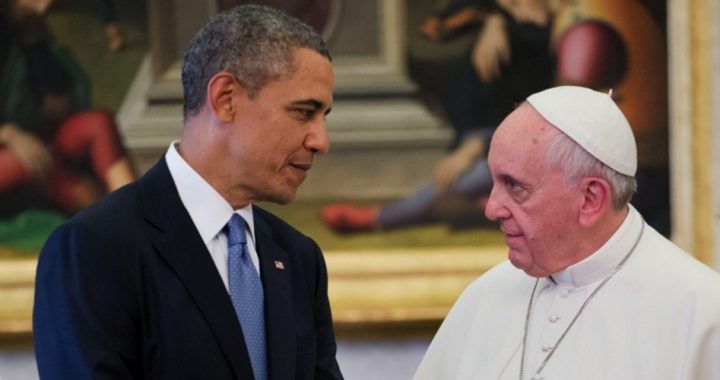
President Obama met with Pope Francis at the Vatican for 52 minutes March 27, and largely avoided policy disagreements during the private conversation. Their meeting comes at a time when dozens of large Catholic Church institutions have engaged in class action lawsuits against the government requirement that religious institutions offer insurance including birth control devices the church opposes, even for celibate priests and nuns who would have no use for the devices.
The papal audience comes just months after Catholic Cardinal Raymond Burke, prefect of the Vatican’s Apostolic Signatura (Vatican’s high court), told Polonia Christiana magazine on January 7 of this year, “It is true that the policies of the President of the United States of America have become progressively more hostile toward Christian civilization. He appears to be a totally secularized man who aggressively promotes anti-life and anti-family policies.”
President Obama and Pope Francis also exchanged small gifts during the meeting, though disagreements were discussed before the meeting with one of the Vatican’s cardinals. “I think His Holiness and the Vatican have been clear about their position on a range of issues, some of them I differ with, most I heartily agree with,” Obama noted at a press conference after the meeting. Obama said after his meeting that he only discussed “income inequality,” immigration, and foreign policy with the pope. “And he actually did not touch in detail on the Affordable Care Act. In my meeting with the Secretary of State, Cardinal Parolin, we discussed briefly the issue of making sure that conscience and religious freedom was observed in the context of applying the law. And I explained to him that most religious organizations are entirely exempt.”
But Obama’s remarks were materially false, as at least 43 Catholic organizations, including Notre Dame University and the Archdiocese of New York, have filed a lawsuit against the Obama administration seeking the exemption that Obama claims they are already entitled to receive.
Moreover, the Obama administration has repeatedly used Justice Department lawyers to argue in court that the Catholic Church lawsuits should be dismissed, usually on technical issues. In the lawsuit filed by the Catholic Diocese of Fort Worth, the U.S. district court for the northern district of Texas issued an injunction against enforcement of the mandate on diocesan employees. Obama administration lawyers then used the possibility of the administration later approving an exemption for the diocese as ground for the church’s supposed lack of standing to sue. But the court said the administration’s “assertion that the Diocese’s concerns stem merely from its ‘own personal choice to prepare for contingencies that may never occur’ is disingenuous.”
Obama’s much vaunted “exemption” does not include any religious organization that has any dealings with non-Catholics. For example, a charitable order of nuns, the Little Sisters of the Poor, were not found exempt. And they took the unusual course of going public with their complaint on March 1, charging that Obama has left them the option of choosing between their faith and following the law. The nuns explained:
The Little Sisters of the Poor have always done their best to comply with all the government regulations applicable to our homes. We are not prone to making statements on politics or public policy. But at this moment in our country’s history we cannot refrain from speaking out regarding the U.S. Department of Health and Human Services rule for “preventative services,” and the “compromise” announced by President Obama regarding religious liberty.
We Little Sisters of the Poor stand with the Catholic Bishops of the United States, and leaders of many other religious communities, in strongly objecting to this mandate. We believe that it violates the individual and collective religious liberty and freedom of conscience of the Little Sisters serving in this country.
For Obama, forcing people to pay for contraceptives is central to the entire concept of ObamaCare. In Hobby Lobby v. Sebelius, the Obama administration lawyer, Solicitor-General Donald Verrilli, verbally argued before U.S. Supreme Court Justice Anthony Kennedy that if it couldn’t make Americans pay for contraception despite religious objections, virtually the entire purpose of ObamaCare would be defeated:
Justice Kennedy: Is it your position that part of the compelling interest here is that you have to protect the integrity — the operational integrity of the whole Act?
Solicitor General Verrilli: It is part of our argument, absolutely. And — but it — but there is in addition to that, much more —
Kennedy: Does that mean the constitutionality of the whole Act has to be examined before we accept your view?
Verrilli: Well, I think it has been examined, Your Honor, is my recollection.
(Laughter.)
Verrilli: But — but with respect to — but with respect to the — there is a particularized interest here in that what we are talking about is a question of whether 14,000 employees and their families get access to this contraceptive coverage.
Of course, the purpose of forcing people to violate their religious consciences to pay for contraceptives as part of a government healthcare regimen is only the beginning. Verrilli strongly implied in the same oral argument before the U.S. Supreme Court that the government could later choose to force Americans to pay for abortions as well, if the law were changed. This precedent of forcing Americans to violate their religious conscience was not lost on the Little Sisters of the Poor, who suggested in their March 1 protest letter that “If the federal government succeeds in enforcing this rule, what is to stop it from rationing health care to seniors or including euthanizing procedures on the list of required ‘preventive services’ as a way of eliminating the costs associated with caring for our aging population? Would health care providers like the Little Sisters of the Poor then be forced to cooperate in such practices?”
Yes they would, Verrilli’s logic in oral argument in the Hobby Lobby case suggested.
Photo of President Barack Obama meeting with Pope Francis: AP Images



